One enters off the entry courtyard into a beautiful faux-stone stairhall. While the floors and stairs are marble, the walls are plaster molded and painted to appear as if limestone blocks.
The architect ingeniously laid out the L-shaped plan so that it flows seamlessly without any hard corners in the hallways.
Lighting is so important and this house proves the point. The lower level is glamorously lit, the ground level nicely lit with beautiful fixtures, while the private floor is actually rather cozy and dimly task lit. You'll notice a lot of photos of light fixtures in my posts! This is a great historical house museum as no HIDEOUS recessed lighting has been installed, the bane of my existence -it should be limited to airports and bathrooms. But you didn't come here for my thoughts on recessed lighting.....
The kitchens are just beyond the entry on the ground level. One can almost feel the 'Downton Abbey' vibe - Mrs. Patmore must be just around the corner!
Efforts have been made to set the house up as for daily use -even the servant's dining hall table is set for a meal. Remember this photo to contrast with the family dining room upstairs.
Guests and family members were of course rarely, if ever, in the kitchen. One would ascend the stair into the gallery with views down to the entry courtyard.
A suite of rooms hosted guests with great flow for parties. The Grand Salon was of course the main entertaining space.
Gilded boiserie, the best of the Count's 18th century furniture, and stunning views of the backyard and park from this raised level are featured in these rooms.
These were public spaces to impress guests and show the stature of the Camondo family.
As the true mark of a collector, the house is not 'decorated' per say; there are not matching suites of furniture but rather many different pieces of different woods and styles mingling together.
As with all great architecture, alignment is given to doors and windows to create lovely enfilades. No one fails to notice such thoughtful gestures in the design of buildings.
After the Grand Salon one is introduced to the Salon Huet, so named for the paintings by Jean-Baptiste Huet inset into the paneling.
One of my favorite rooms in the house is the dining room, featuring beautiful green painted boiserie.
The table is set for a meal displaying some of the large collection of the Count's 18th century china, silver, and crystal.
In order to better display parts of his collection a china cabinet or room was built adjacent to best display his most favorite services. He would often take private meals in this space overlooking the backyard.
Down the hallway is of course a more useful butler's pantry.
The gallery surrounds the public rooms which are all on the left. The door at the end of the hallway leads into the dining room. The butler's pantry is just to the right. Notice how the dining room door doesn't fit the mirrored paneling in order to fit the antique boiserie found in the room. The architect didn't let that mess with the hall's symmetry!
The niche adjacent to the main stair contains access to the private areas of the family.
This small office or petit bureau below was perhaps used as the Count's private study. The French doors lead over the roof of the garage to the office block discussed in the previous posting.
One of the many things I like about old houses is the use of natural light. Staircases, hallways, bathrooms, and kitchens all feature good sized windows.At the top of the stairs is the private paneled family library.
After the Count's wife passed away he turned her bedroom into his private (colorful) sitting room -one of the most popular rooms on the tour.
These two rooms feature the best views of the Parc Monceau.
I could happily live in this room without changing a thing!
Below you see the view of the backyard from these windows with the park just beyond the bushes.
The bedrooms hold various parts of the collection but the most interesting thing to see are the bathrooms. While not entirely original they reflect the period atmosphere.
Notice the high tiled vaulted walls, abundant natural light, and easily cleanable fixtures.
The count's son's bathroom was no less elegant and featured an odd assortment of various baths and basins for feet as well as other......items. Please remember to visit this amazing house museum on your next visit to Paris! Tomorrow I will feature some of my favorite details found throughout the house.




















































.jpg)



















.JPG)


























































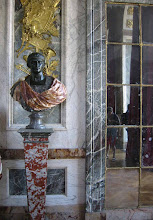


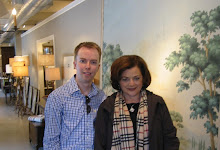
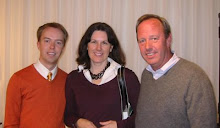





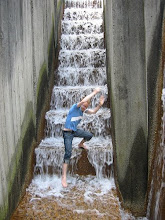

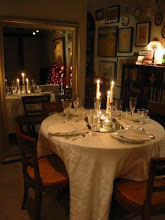
9 comments:
Will definitely bookmark this post and the last and the next for future visits! Magnificent.
Superb tour and photos...other than the kitchen at Marble House in Newport, I adore this one.
Such a sad ending for the family as the daughter and her family were sent to Concentration Camps and didn't survive...the house was filled with History of the Ancien Regime, even the end tragedy of that era seems built into its very foundation...hopefully those like yourself who wander the halls and rooms searching for Beauty will bring a karmic cleansing over the years, perhaps it's complete now!
Alas, the Comtesse de Camondo (the former Irène Cahen d'Anvers) left Moïse's house in rather more dramatic and unfortunate circumstances than merely dying - a fact that seems to have be tactfully omitted from the family history room in this wonderful house-museum that we all so greatly admire. I always wonder if she felt any remorse given what happened to her children. And your admirable views on recessed lighting cannot be repeated too often - we would have thought to have seen the demise of these tired old relics of the '70s long before now. Alas no.
What a wonderful tour you've provided your loyal readers today, thank you. I've not had the pleasure of visiting this magnificent house museum, but will next time I am in Paris. I adore the green of the dining room (so fresh!), the porcelain room, the butlers pantry, the kitchen... all divine!
Truly one of the greatest treasures of historical world décor! During my lengthy stay in Paris several years ago, even though I visited the parc Monceau, I somehow managed to miss this.... : (
I really encourage everyone to visit if you haven't before, my snapshots scarcely do it justice! Even though I had often heard of it, very few people I know had visited. It is a bit off the beaten path in Paris admittedly but worth the trek.
Absolutely stunning! I was in Paris 18 months ago and walked through Parc Monseau....I am so sorry I missed this Musee Nissim de Camondo. I particularly love the cantilevered stairway in the entry courtyard. It reminds of the "flying staircase" in Castletown House in Ireland. I did visit Vaux le Vicomte and it is set up very similarly with rooms done as they would have been in the late 1600's .... thank-you for sharing something new that will be on my itinerary for the next trip to Paris!
Thanks for the tour, Stefan. I'm in love with those bathrooms, and I believe the last image is the first tile work I've seen that suggests a plaid! I'd love to create something along that line someday . . .
When I went there a little more than 3 decades ago now it was very quiet and open so that I was not forced to weave in and out of anyone or anything besides the furniture. So quiet that it seems befitting as a memorial to a family that ended tragically during the 2nd WW....hard to escape from that literature which I read before my visit. Found it strangely located down an alley type of entrance without a monumental gate...the only thing to distinguish the property... from the exterior... from Louis XVI (?) times.
Post a Comment